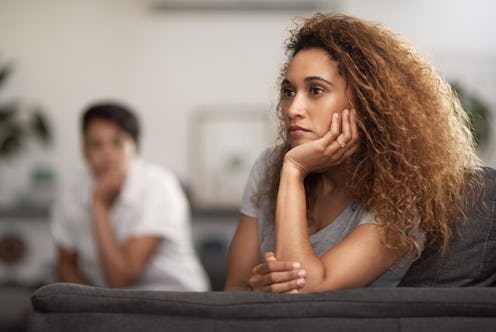Sex & Relationships
Yes, Your Partner Could Be Hurting Your Mental Health
Relationship experts weigh in.

When entering into a new relationship, we’re always on the lookout for red flags, like if a wanna-be suitor is controlling, complaining, or emotionally immature. But what if you’ve settled into a relationship and things still feel off kilter? Maybe your partner is wonderfully hunky dory, but your mental health is deteriorating. What now?
Focus instead on the “green flags,” says Sarah Louise Ryan, a dating and relationships expert. “The foundations of a healthy relationship [should include] boundaries, verbal and nonverbal, and you should always feel seen, heard, and like they get you and accept you for who you are.” If those are absent, she says, your mental health could be at risk.
"Relationships are arguably the most impactful, meaningful aspect of life, and they can impact us in very different ways, depending on the relationship," adds psychologist Holly Parker, the author of If We're Together, Why Do I Feel So Alone?: How to Build Intimacy with an Emotionally Unavailable Partner. "Some [people] have the power to uplift our spirits, to lend comfort during life’s strains and stresses, to weave fun and playfulness into our day, and to imbue life with a profound sense of purpose. Sadly, others can pull us down, drain our energy and emotional reserves, fill us with heartache, and erode our happiness,” she says.
Below, experts share seven signs that your relationship may be hurting your mental health and exacerbating conditions like depression and anxiety.
1You've Developed Depression Since The Relationship Started
“If your mental health isn’t in the right place, it doesn’t mean you need to break out of your relationship, but you should get help,” says therapist MoAndra Johnson, who specializes in relationship conflict. If you are experiencing depression, consult a professional, she says.
It’s possible that your partner is contributing to your depression, as people in unhealthy relationships are more likely to show symptoms of depression, according to a 2014 study in the Journal of Family Psychology. And at their worst, toxic or abusive relationships can lead to suicide ideation, according to a 2016 study in the Journal of Affective Disorders.
2Your Physical Health Has Declined
A 2001 review in Psychological Bulletin found that relationships have "direct influences on cardiovascular, endocrine, immune, neurosensory, and other physiological mechanisms." There's a real connection between mental and physical health, adds Parker, so an unhealthy relationship can cause headaches, insomnia, or muscle pain just as easily as it can cause anxiety or depression. Listen to your body and take care of it mentally and physically.
3You Can’t Talk To Them About It
As long as you can communicate your mental-health struggles with your partner, a period of difficulty doesn't have to signal the relationship’s end. “They could be doing something that’s genuinely not intentional,” Johnson says. “Let them know what you believe is hurting your mental health, and pay attention to their response. It will show if they’re supportive or not.”
It could feel uncomfortable, but you owe it to your partner to try to talk about it, Ryan adds. “In a relationship that’s solid, you can show up and present the good, the bad, the ugly, and work through those things together,” she says. If you’re unable to do this, it could signal irreparable damage, or if you advocate for yourself and get a negative response, you have your answer: Your relationship is likely taking a toll on your mental well-being.
4You're Relieved When Your Partner Leaves
Do you experience a sense of relief when your partner has left and you’re on your own? A feeling of relief could indicate that your partner is causing you stress, says Parker, especially if it's accompanied by "a sense of weight and physical tension in the partner's presence."
5Your Self-Esteem Has Plummeted
“If you’re focused on how they perceive you and how attractive you are to them, and less on your needs and whether you’re actualizing them, that is a big red flag,” Ryan says. “You’re letting something happen to you rather than taking control of what you deserve.”
According to Parker, this could be a sign that your partner is responsible for your decreased self-esteem, whether in a subtle way, like ignoring or gaslighting you, or more overt, like insulting you.
6You Feel Trapped In The Relationship
"If a partner isn't having a positive impact on your emotional well-being, your mind will be more likely to show you the exit door," Parker says. In some abusive relationships, people may like they can't leave for emotional, physical, or financial reasons. But if you’re fantasizing about leaving your partner, trust that instinct.
7You Can Trace A Lot Of Your Problems To Them
"Although many stressors in life can undermine emotional health, the possible role of relationships should not be dismissed," Parker says. "If a romantic relationship is having a negative impact on your psychological well-being, it’s vital to turn attention to that." Take an honest look at the roots of your mental-health problems. If your partner is the source of most of them, the relationship is likely doing more harm than good.
Editor's Note: If you or someone you know is experiencing domestic abuse, call 911 or the National Domestic Violence Hotline at 1(800) 799-SAFE (7233) or visit thehotline.org.
Experts:
Sarah Louise Ryan, matchmaker and dating and relationships expert
Holly Parker, Ph.D., psychologist, educator, and author
MoAndra Johnson, MFT, therapist
This article was originally published on